Feature: Briley Lewis, Zine Maker
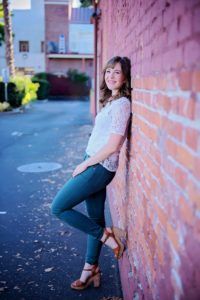
Zines are short, self-published booklets. They’ve been around for a long time, but it was exciting for me to talk to Briley Lewis, a graduate student, zine maker, and science communicator. Whether color or black and white, zines are full of cool information and neat art.
You can find Briley’s zines (and other creative projects) on her website or her Etsy shop. You can find articles she has written at astrobites. And don’t forget to follow her on social media! She’s on Twitter & Instagram!
If you enjoy this interview, let me know in the comments or via my contact form. If you’re interested in being featured, contact me and let’s talk about what you do!
Until next time, keep your creativity flowing!
Q: Hi, tell me a bit about yourself!
Hi! My name is Briley Lewis, and I’m a graduate student who makes zines and other creative things in my spare time. I’m in my second year of my PhD in Astronomy & Astrophysics at UCLA, and my research focuses is on planets (both in and out of our solar system). Although grad school is pretty hectic, I try to make time for keeping in touch with my creative side, so I make zines, jewelry, and sometimes embroidery, too.
Q: What are zines?
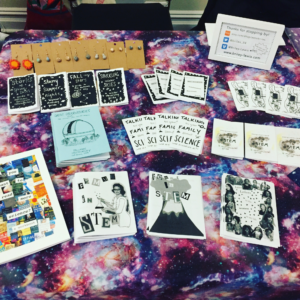
Zines are DIY self-published magazines.
I personally think zines are a cool art/media form because of their independent nature — pretty much anyone can make them, they’re inexpensive to produce, and they’re usually sold for fairly cheap, so they’re a very accessible form of art and information. You can find zines at some libraries and bookstores nowadays, on the internet, and also at your local zine fest; zine fests are a gathering of many artists and zine makers who sell and trade their work, and they’re so much fun.
They have a history in riot grrl and other punk/counterculture movements, since they’re a great way of getting information out without the need for a publisher or reliance on any other big institution. Nowadays, there are zines about pretty much everything, and the zine community is incredibly diverse and (at least in my experience) really welcoming and inclusive accepting of all identities.
The first fest I attended was the NYC Feminist Zine Fest at Barnard College – I hadn’t started making anything yet, and I didn’t even know what zines were, but I loved all the unique and relatable stories, beautiful drawings, and super cool people I met there. I knew I wanted more, and so I started making my own! Since then, I’ve tabled at a few fests myself, and I still love attending them to see what other people have made.
Q: What is your favorite part of making zines about science?
So, I started making zines about science since that wasn’t something I hadn’t really seen yet, and I thought it would be a unique way to communicate science. Turns out, I’m not the only one who’s doing this, and there are actually lots of fabulous makers creating zines about various fields in STEM!
Turns out, I’m not the only one who’s doing this, and there are actually lots of fabulous makers creating zines about various fields in STEM!
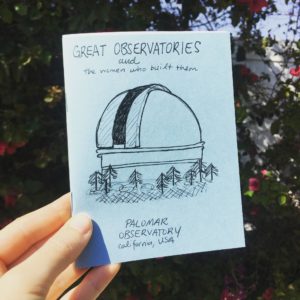
That’s really been my favorite part so far, meeting other zine makers, both at zine fests and on the internet, both STEM-focused and not. They’ve been so supportive, and their work is amazing – some make personal zines, some about the environment, some about biology or chemistry or climate change. Also, many of these zines aren’t just about science – there are thought-provoking zines about science policy, how science and technology influence society, life as a graduate student in STEM, science and inclusion, and so much more.
Just to shout out a few of the people who have influenced me the most on my science zine journey…you should totally check out the zines from Christine Liu (@christineliuart), Sophie Wang (@wangshuf), and Olivia Wilkins (@livwithoutlimit). I also was lucky enough to recently be a part of the coolest tech-oriented zine fest, Tiny Tech Zines (@tinytechzines), which had so many informative and awesome zines about science and tech! I’ve really enjoyed the zine community, and I’ve learned so much (about the world, about science, about mental health and self-care, about myself) from my interactions with people involved with zines – so many genuine, nourishing conversations can happen in that space where people are being wonderfully vulnerable by sharing their art and their story.
Q: What is the most important skill you’ve gained for making zines?
Hm, this is a hard one. I’ve definitely gotten better at drawing (just through practice), and making these zines has been a learning experience on how to convey information using both words and formatting on a page. I’ve also gotten a lot of practice talking to other people about science by selling at fests!
Q: What advice do you have for people who want to make zines about science?

Just do it!
Anyone can start making zines, and there aren’t really any rules. There’s an easy way of folding a 1 page zine (google “1 page zine template” and you’ll see), and that’s how I got started! If you start making zines and you want to share your work with the world, find your local fest – you can attend and bring some zines to trade with people, or you can apply to table there and sell your stuff. If that’s not your jam, share zines with your friends, post them online, or keep them just for you.
There’s no wrong way to make zines, just express yourself and write about your interests! There also aren’t any extra prerequisites to be a called a “zine-maker” — no secret club rules, no level of status to attain, nothing besides just making some zines. 🙂
There’s no wrong way to make zines, just express yourself and write about your interests!
Q: What advice do you have for people looking to find zines about science?
Go to your local fest! There are zine fests all across the U.S. (and actually around the globe, too). A quick google search should help you find them. Also, follow zine makers on Twitter and Instagram – they’ll post about new things, and about zine fests they’re going to.
Q: Where can the audience find out more about you and your work?
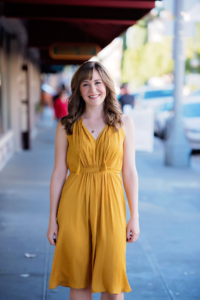
You can find out more about me (research, teaching, outreach, zines, etc.) on my website, www.briley-lewis.com! Some of my zines and jewelry are also available for sale at astrobriles.etsy.com. You can keep an eye out for new zines on my Instagram @astrobriles, and hear about zines + grad school life + generally cool science stuff on my Twitter @briles_34!




